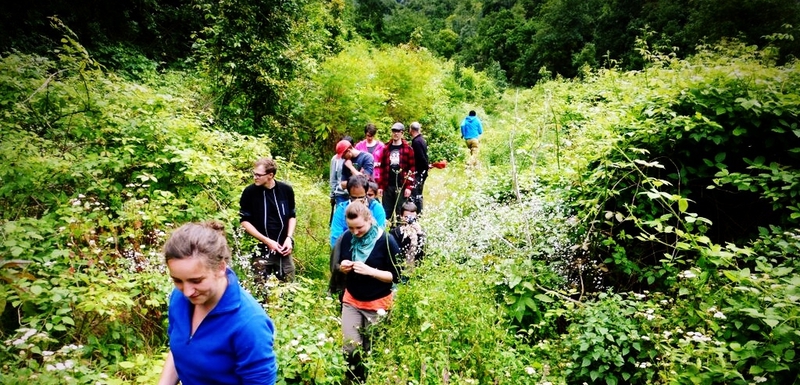La Palma Science School 2015
How do plants adapt to a changing environment? Can we collect drinking water with the help of a pine forest? In which way do different plant species interact?

Answering these and other questions was the task of 15 students who set out to discover ecosystems on La Palma, the North-Western island of the Canaries. This was an exclusive chance to gather field experience in diverse environment and to learn more about how ecology and environmental change go hand in hand.
In advance, the Bayreuth students from Global Change Ecology, but also Geoecology and Physical Geography, started to work in groups of three to propose a hypothesis on their individual topic. Practical limits of conducting the study had to be detected and all the necessary background information and material needed to be collected.
At the beginning of April, the group set foot on the island to apply all their theoretical preparations in the field. The first days were used to familiarize the students with the La Palma. Prof. Carl Beierkuhnlein and Prof. Carsten Hobohm explained the island’s (bio)geography, geology, history and culture in order to understand the full range of the ecosystems. The group also went to the Caldera de Taburiente National Park visitor centre as there is still an active caldera on this volcanic island.
After that, the individual groups had to take care of the tasks they had set themselves to collect data. They had to challenge practical problems such as access to study sites, weather conditions and time limitation and learned (by doing) what it means to conduct an experiment in the field with given conditions and to perform standardized methods in order to get statistically valuable results.
During the summer term, the students will be guided through the process of analyzing their data and communicating their findings in a written paper.

The scientists who participated with their helpful advice and expertise were not only from Bayreuth, but all over the world:
- Prof. Dr. Carl Beierkuhnlein, Universität Bayreuth link
- Prof. Dr. Anke Jentsch, Universität Bayreuth link
- Prof. Dr. Carsten Hobohm, Universität Flensburg link
- Prof. Dr. Rebecca Ostertag, University of Hawaii at Hilo link
- Prof. Dr. Richard Field, University of Nottingham link
- Prof. José-Maria Fernandez-Palacios, University of La Laguna link
The summer school was organised by the Department of Biogeograpy and Global Change Ecology (M.Sc.).
Research groups:
Five groups of students worked on the following topics:
- How does wind influence altitude of treeline?
- Can we find a more unique species composition in isolated valleys?
- Do succulent species thrive better in arid regions?
- Can we expect a biodiversity vacuum at low altitudes due to climate change?
- How does the amount of fog collected by the canary pine change with altitude?

Application deadline has passed, next application starting in October 2015

